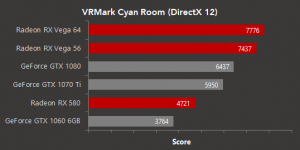Futuremark has announced the release of VRMark Cyan Room. VRMark Cyan Room is a VR benchmark that uses a pure DirectX 12 engine built in-house and optimized for VR. This benchmark tool features a large, complex environment and many eye-catching effects.
Players can run the test on their monitor or on a connected HMD. The benchmark runs on a fixed path, which makes it easy to repeat the test on other systems to compare performance.
At the end of the test, players will see if their PC was able to meet the target frame rate. Moreover, a comparison with other systems, and detailed hardware monitoring charts will be present.
VRMark Cyan Room also offers an Experience mode with a VR headset to judge the performance of a system. This mode lets you freely explore the Cyan Room in your own time. You can change the rendering resolution and other settings to make the scene more or less demanding. Experience mode is a great way to see how performance affects your VR experience.
Furthermore, it appears that this DX12 benchmark runs incredibly well on AMD’s hardware. The red team revealed some benchies in which the VRMark Cyan Room runs great on its hardware. Both the AMD Radeon RX Vega 64 and 56 ran the benchmark better than NVIDIA’s GTX1080. The performance difference between the RX Vega 64 and the 1080 is 30fps. AMD did not include the GTX1080Ti, so our guess is that NVIDIA’s top GPU may be slightly faster than the RX Vega 64.
Cyan Room is available now as a free update for the full version of VRMark.
Enjoy!

John is the founder and Editor in Chief at DSOGaming. He is a PC gaming fan and highly supports the modding and indie communities. Before creating DSOGaming, John worked on numerous gaming websites. While he is a die-hard PC gamer, his gaming roots can be found on consoles. John loved – and still does – the 16-bit consoles, and considers SNES to be one of the best consoles. Still, the PC platform won him over consoles. That was mainly due to 3DFX and its iconic dedicated 3D accelerator graphics card, Voodoo 2. John has also written a higher degree thesis on the “The Evolution of PC graphics cards.”
Contact: Email



